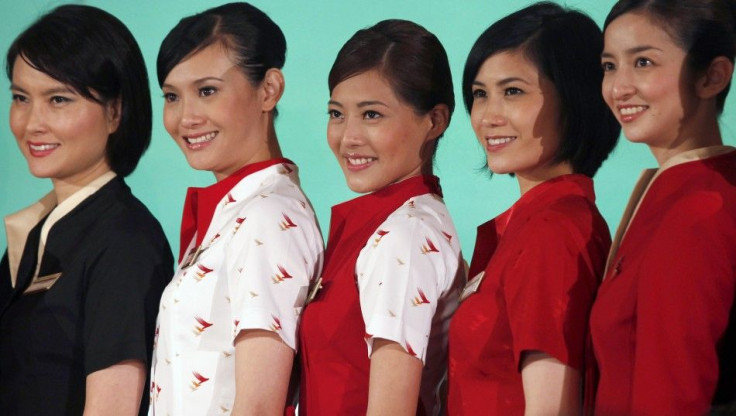27 Percent Of Flight Attendants Sexually Harassed On The Job

If you’re searching for a career that offers regular sexual harassment, you may want to consider a job as a flight attendant.
According to a new survey from the Hong Kong-based Equal Opportunities Commission, more than one-fourth of all air hosts and hostesses indicated that they had been sexually harassed while on duty in flight over the past 12 months, while nearly half had witnessed or heard about one of their colleagues being sexually harassed.
EOC based its findings on the results of 392 returned questionnaires that it distributed to 9,000 flight attendants working for Cathay Pacific, British Airways, United Airlines and other carriers working in partnership with the Hong Kong Flight Attendants Alliance. The commission said the low response rate for its survey may reflect the fact that many consider sexual harassment an embarrassing or difficult subject to discuss.
Of the survey respondents, 86 percent were female and 14 percent were male. Roughly 29 percent of the female respondents claimed they had been sexually harassed in their work setting in the past year, compared to 17 percent of the male respondents.
“Patting, touching, kissing or pinching” were the most common complaints, followed by nonverbal sex cues, sexual jokes, requests for sexual favors and the showing of obscene or pornographic materials.
“Sexual harassment continues to be a serious issue in workplaces,” John Tse Wing-ling, who leads the EOC’s Policy and Research Committee, said in a summary of the report. “Service providers can be especially vulnerable to sexual harassment by a customer or client in the course of provision of goods and services.”
EOC found that sexual harassment of flight attendants by customers (59 percent) was significantly more prevalent than sexual harassment by fellow staff (41 percent) such as senior cabin crew and cockpit crewmembers. Yet, the Commission found that many flight attendants were reluctant to report it for fear of worsening their employment situation.
One-quarter didn't take any actions while another quarter simply mentioned the harassment to a fellow colleague or relative. Just 50 percent reported it to a senior colleague or lodged a complaint.
Though most international airlines have a policy statement on sexual harassment, 39 percent of those who responded to EOC’s survey said they weren't aware of one for their carrier. Only 11 percent, meanwhile, said that their company’s policy statement included information on how to handle complaints.
Tse noted that companies should “manage their risks prudently and take reasonably practicable steps” to prevent such conduct. “In providing a safe, productive and harassment-free working environment for their staff, employers will foster a successful business environment,” he said.
Some analysts say the airlines themselves are to blame not just for making their policies unclear, but for advertising their flight attendants as sex objects rather than safety experts. Asian operators, in particular, have been accused of selling the “quality” of their service by objectifying their female employees.
Beyond dealing with sexual harassment, other recent surveys indicate that the glamour once associated with being a flight attendant has long since faded away. In fact, job-finding website CareerCast claimed flight attendants had the worst job in the travel and tourism industry in a 2013 Jobs Rated Report, which assessed positions based on pay, stress, physical demands and future prospects. The researchers suggested that only roofers, mail carriers, meter readers, dairy farmers, oil rig workers, actors, military personnel and newspaper reporters had it worse.
© Copyright IBTimes 2024. All rights reserved.






















